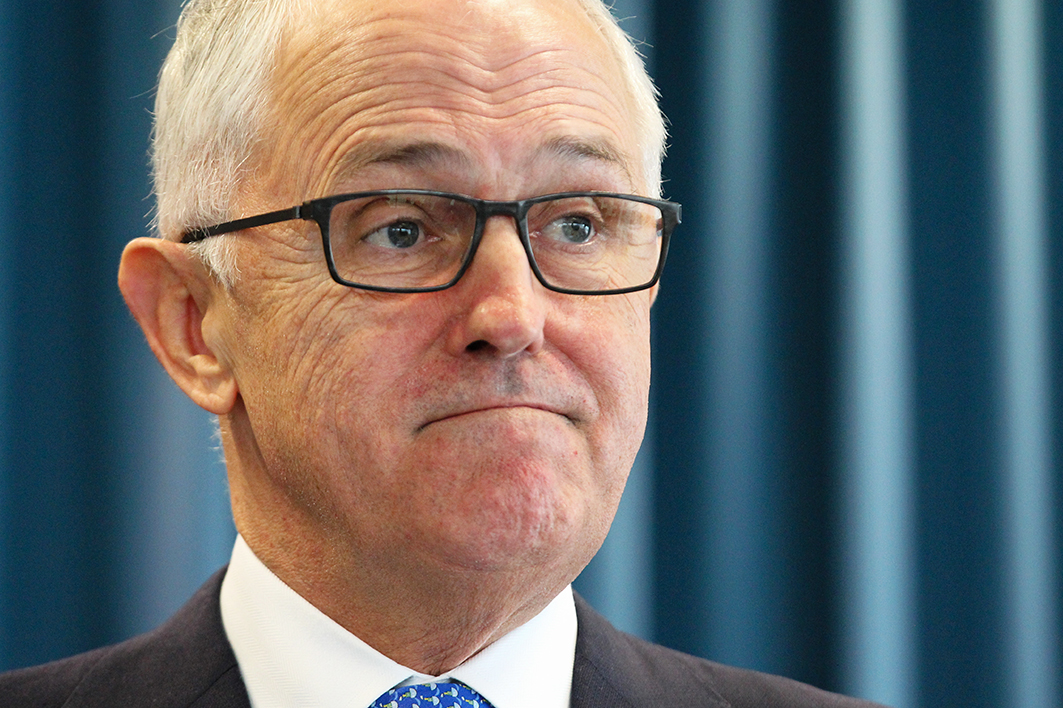It is written in history’s pages that climate change demolished Malcolm Turnbull’s leadership of the Liberal Party in the dying months of 2009. But that wasn’t really the issue; it was a long, long series of dreadful opinion polls.
If his support for the Rudd government’s carbon pollution reduction scheme hadn’t triggered a party revolt, something else would have. And had the Coalition appeared at least competitive in voting-intention surveys, the Liberal party room would have tolerated Turnbull’s enthusiasm for pricing carbon — as it had John Howard’s claimed intention throughout 2007 to introduce an emissions trading scheme.
This week, it’s same-sex marriage — on which the prime minister called an emergency meeting — that’s causing enormous grief and threatening to tip him over the edge. Except, again, it’s really about the polls, on top of the poor result at last year’s election.
Nothing generates authority for leaders like perceived electoral prowess. Howard’s longevity was grounded in the widespread (but erroneous, in my opinion) conviction that only he could have pulled off that series of victories between 1996 and 2004. Leaders who look like they’re taking their party to defeat, on the other hand, will find themselves friendless.
Today’s Newspoll, published in the Australian to greet the parliamentary session, gives yet another 53–47 in Labor’s favour. A six-point, two-party-preferred gap is hardly insurmountable for a government, but there have been too many results like this. It’s been so long since the Coalition was regularly ahead, and Turnbull can point to no glorious return-from-behind tales in his backstory.
Over at Fairfax, meanwhile, an Ipsos focus group reports deep disappointment with this do-nothing, timid prime minister.
Way back in March last year, with an election on the horizon, cabinet secretary Arthur Sinodinos let slip in an Insiders interview that “a returned government with Malcolm Turnbull at its head after the election I think will have the capacity to stamp its authority on all sorts of issues.” People in the party, he predicted, “will respect that.”
Party conservatives understandably viewed this statement as provocative. But their fears proved unfounded because the government was only just returned (although the closeness shouldn’t be overstated: with sixty-nine lower house seats to the Coalition’s seventy-six, and five others, Labor is quite a distance from government) and the Senate make-up proved not much better for the government than it was during the last term.
Turnbull’s authority remained unstamped. Instead, the knives came out on election night, 2 July.
What might those “all sorts of issues” have included? One naturally thinks of the two he had to give up to regain the leadership: opposition to a plebiscite on gay marriage and a resolve to act on climate change. The latter is, to the point of caricature, a matter of ideological purity for the conservative rump of the party.
A big-winning, reauthorised prime minister dragging his party into the twenty-first century on these two policies would’ve been worth the price of admission. Back in real time, though, a lethargic economy contributes to public grumpiness with those in power. The election result and continuing poor polling give succour to party conservatives, determined to see the government’s woes through the conservative-progressive prism. The Senate sure doesn’t make life easy.
And if same-sex marriage doesn’t break the back of Turnbull’s leadership, the stoush over a renewable energy target might do it.
In an Essential poll in the Guardian last week, Turnbull was the most popular of the preferred Liberal leaders, at 25 per cent, with Julie Bishop runner-up on 20. Tony Abbott is on 10 (as usual) and Peter Dutton and Christopher Pyne sit on 3 each. Scott Morrison attracted just 2 per cent.
Turnbull is doing quite well for a leader in deep trouble. Julia Gillard spent years behind Kevin Rudd on these measures, and as far as I know no opinion poll in history has ever found Tony Abbott preferred Liberal leader, in opposition or in government.
Yet the odds remain against Malcolm lasting out the year, and the likely successor is not Bishop, or even Abbott, but Mr 3 per cent, Peter Dutton. If not him, then Scott Morrison. It’s a right-winger’s turn, you see; they’ve tried the left-wing experiment.
A cynic might even anticipate that if Turnbull decides it’s all too much he will engineer another glorious defeat, all guns blazing, on one of those matters of principle.
Politicians do like to keep an eye on those history books. •





